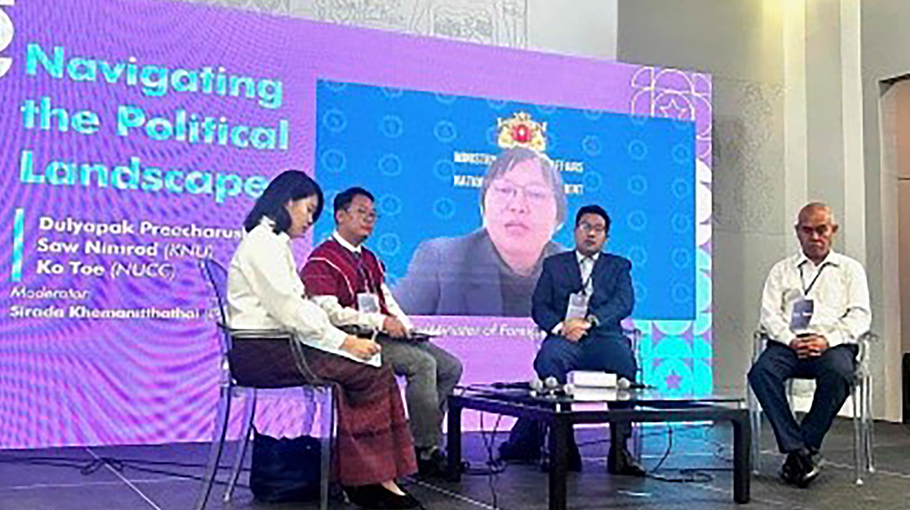Myanmar junta cries foul as Thai parliament hosts anti-regime figures

The Myanmar military junta has “strongly objected” to the Thai parliament’s hosting of a seminar on the situation in Myanmar that was joined by senior figures from Myanmar’s anti-junta shadow government, Thai opposition lawmakers, democracy activists and others.
Despite the objections, the event, “Three Years after the Coup: Towards a Democratic Myanmar and Its Impact on Security Along the Thai Border,” was held at Parliament House in Bangkok on Saturday and Sunday.
A few days prior to the seminar, the junta’s Foreign Ministry said in a “secret” letter sent to the Thai Foreign Ministry that hosting the event at Parliament House would create “negative impacts on the existing friendly bilateral relations between Myanmar and Thailand,” according to a copy of the letter viewed by The Irrawaddy.
The junta ministry asked “the Government of Thailand to relay Myanmar’s concerns on the said activity to the Parliament of Thailand and notify them not to carry out any activities that could hinder the ongoing cordial ties in the future,” it added.
Rangsiman Rome, the head of the House committee organizing the two-day event and a lawmaker from Thailand’s opposition Move Forward Party, said at the seminar that the event was a first step in bringing a variety of stakeholders to talk to each other in order to pave the way for a political solution for Myanmar that is peaceful and sustainable.
He is the chairperson of the Standing Committee on National Security, Border Affairs, National Strategy and National Reform.
Speakers included Myanmar’s UN Ambassador U Kyaw Moe Tun, who represents the shadow National Unity Government (NUG) at the world body; NUG Foreign Minister Daw Zin Mar Aung; senior figures from ethnic armed organizations; and UN Special Rapporteur Tom Andrews, among others.
Pita Limjaroenrat, the ex-leader of the Move Forward Party, and former Thai Foreign Minister Kasit Piromya also joined the event.
Thai Foreign Minister Parnpree Bahiddha-Nukara was scheduled to deliver a keynote speech at the event but canceled at the last minute.
Myanmar, which shares a more than 2,400-km-long border with Thailand, has been in social and political turmoil since the military coup in 2021. Military rule in the country has become a threat to regional stability as the regime faces nationwide armed resistance and is not able to control the country.
Some of Myanmar’s established ethnic armed groups and anti-regime resistance forces have been fighting the junta since the military coup in 2021. When fighting breaks out near the border, refugees flee to the Thai side.
However, the Thai government has maintained good relations with the junta, a state of affairs that former Foreign Minister Kasit described during the seminar as very “illogical”, given that Thailand prides itself on being a democracy.
The two-day seminar came as the Thai government prepares to work with the Myanmar military and other groups to open a humanitarian corridor to deliver aid to those affected by fighting in Myanmar.
At the same time, Thailand is likely to see more people—most of them young—from Myanmar entering the country both legally and illegally to evade the junta’s recently activated conscription law.



